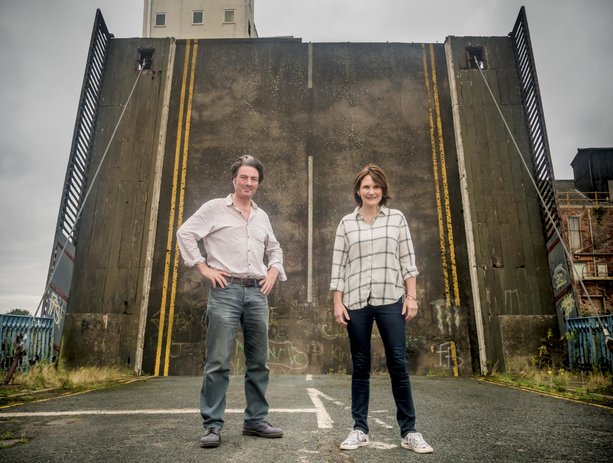Historic buildings festival highlights the pulling power of Hull’s heritage

Rich and Lou Duffy-Howard at Scott Street Bridge.
PROPERTIES ranging from museums, galleries and churches to offices, workshops and theatres opened up to give members of the public a glimpse of what goes on behind the scenes.
The launch of HODS once again took place at the Hull office of Wilkin Chapman Rollits, a firm created by the merger in April this year of Wilkin Chapman, founded in Grimsby in 1900, and Rollits, which dates back to 1841 and has always operated from an office in Hull’s Old Town.
Chris Drinkall, joint head of the firm’s Hull office, said: “We have been hosting the Heritage Open Days launch event at Citadel House in High Street for 10 years and we are delighted to continue our support of such an important event.
“There is huge admiration across the region for the city’s historic buildings and many of these are used every day, all year round, for culture, business and other events.”
John and Christine Netherwood, who lead around 300 HODS volunteers during the week-long event, praised the contributions of Hull City Council and a number of businesses in the region in helping to deliver the 2025 programme.
John said: “The festival is a part of a much larger, nationwide event run by the National Trust and the sheer scale of Hull's programme is what sets it apart.
“It’s an opportunity for residents and visitors to explore places they might otherwise never see and to learn about the people and events that have shaped Hull. The benefits range from cultural enrichment to economic vitality.
“By showcasing Hull’s unique architectural gems and historical sites, HODS helps to attract visitors, boosting the local economy and supporting the many small businesses that make up our vibrant tourism sector.”
Among the attractions this year was Maister House, the home in High Street of Eclectic Music, an orchestra which offers performances, music lessons for people from six years to 96 years, mental health and wellbeing sessions for businesses and space for other creatives to make use of the space.
Also opening its doors was the Danish Church, which has become a venue for a growing number of cultural and community events. The current building opened 71 years ago to replace the original church which was bombed in 1941 on the eve of its 70th anniversary.
HODS also featured a programme of walks and talks as well as a fascinating online presentation which looks at the bridges which cross the River Hull, and the some of the engineering hidden away inside.
Rich and Lou Duffy-Howard have created a package of images and stories about the river, the bridges and the people who use them. It can still be viewed at https://openbridgeshull.com/
Lou said: “Hull’s River Bridges has been quite a while in the making but it’s been brilliant to link up with so many artists and photographers who have all been inspired by the river and it’s bridges over the years, so please do have a good look around.”
The launch at Wilkin Chapman Rollits was attended by representatives of some of the companies and business support organisations which have supported HODS.
Kirk Akdemir, CEO of AaGlobal Language Services, said: “Heritage Open Days is a terrific event and John and Christine do a great job every year. It’s a pleasure to be able to say that we are one of the companies supporting this brilliant, worthy project.”
Iain Elliott, CEO of Humberside Engineering Training Association (HETA), said: “Hull is undergoing a process of being revitalised with new buildings and infrastructure, and Heritage Open Days gives everyone an opportunity to become more aware of our historical heritage and to celebrate the incredible architecture and the stories that make our city a great place to live, work and do business.”
Dr Diana Taylor, Managing Director of Future Humber, said: “Hull is a place with a truly unique and historic heritage – from its remarkable architecture to its world-renowned maritime story. Heritage Open Days are a chance to shine a light on the people, places and traditions that have shaped our city and that continue to inspire pride, curiosity and connection for generations to come.”
Andrew Allenby, Managing Director of Allenby Commercial, said heritage is a key part of the company’s property portfolio which – in the city centre alone – includes Danish Buildings and the adjoining Bayles House, parts of which date back to the 17th century, and the Victorian Paragon Arcade, built in 1891 by Sir Alfred Gelder.
He said: “We’ve also just opened Monocle, where the heritage of the building shaped the whole re-brand and interior scheme, paying homage to the buildings 70s heritage. The thread which runs through all the sites is that they are protecting Hull’s heritage by delicately bringing heritage buildings back in use, and also supporting the economy by providing high quality space for modern businesses.”



























